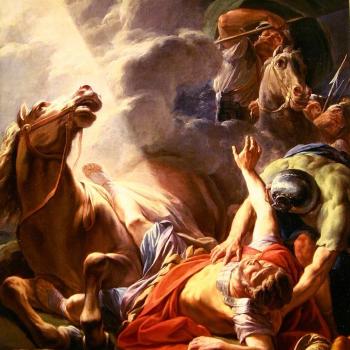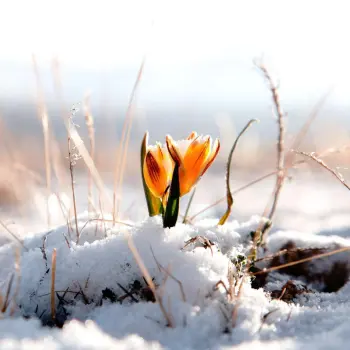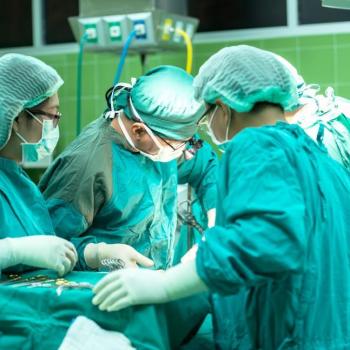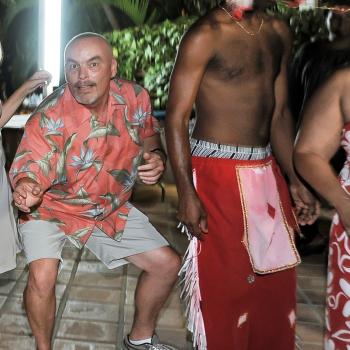Now Featured in the Patheos Book Club
The Hand on the Mirror
A True Story of Life Beyond Death
by Janis Heaphy Durham
What is this book about, in the broadest sense?
This book is about my personal journey to a broader and deeper understanding of consciousness and how love makes it possible for us to connect across boundaries, including death. It's part love story and part scientific and cultural exploration of the survival of consciousness beyond the physical body.
Why did you feel compelled to share this story?
Only very gradually, over eight years, did I come to feel I could and should share my story. I was motivated by the epiphany that the extraordinary events I experienced after the death of my husband, Max Besler, were not as unusual as I assumed. I discovered that too many people are embarrassed to share their stories of contact with or messages from departed loved ones. Like them, I was afraid I would be stigmatized. We should not only respect those individual experiences as valid, but we should also support scientific inquiry into them, as we do with the rest of the physical and sometimes invisible world in which we live.
How many events did you witness (and give some examples) over how long a period of time?
Dozens of things have happened since Max died in 2004 -- some amazing, some more subtle. The book is titled The Hand on the Mirror because of the handprints and other images that appeared out of nowhere on the bathroom mirror in the guest suite where Max died. This happened on the first three anniversaries of his passing, and I took photos of them. That same bathroom wall made a loud clanging noise, and I saw the wall undulating, with no apparent cause that plumbers, pest control experts or I could find. Receipts with uncanny timely connections to Max fell out of books, such as the Father's Day card from his mother that fell out of a book I picked randomly from literally thousands in Max's library. It fell out on the Father's Day just after Max died, as I was feeling melancholy and alone. Max's mother had written in the card that she had never seen him happier, and she knew it was because of his new family. Clocks repeatedly stopped at 12:44 p.m., the exact time of Max's death. Rugs moved -- watched and measured not just by me, but also by my current husband, Jim Durham. The book is full of more examples.
When did you decide this "situation" was something that needed further investigation?
My need to understand these events grew slowly. It took years for me even to accept that they were real and that there might be an explanation. The spark for my investigation was a friend who heard my stories and said, "You come from the newspaper industry. Do what they do. Investigate."
How common is your own experience of the paranormal?
I had virtually no paranormal experiences before Max's death. The closest I had come was a reassuring dream from my grandfather after he died, in which he told me that he wasn't upset by my failure to respond quickly enough to a request he had made just before he died. Afterlife experiences just weren't in my realm of awareness at all. I was publisher of the Sacramento Bee, living in the fact-based, skeptical environment of newspapers. If you mean do others have similar experiences, absolutely. History is full of these stories, and researchers have documented literally thousands of such accounts.
Why do you think people, especially Christians, such as yourself, who purport to believe in life after death, are still suspect of the supernatural?
That's a complex question that I probably can't fully answer. My understanding of heaven from my upbringing as the daughter of a Presbyterian minister was that it existed as a place to be with God when we die. Some Christians may fear the supernatural, but that generally wasn't my experience with the events after Max passed. Yes, sometimes early on I felt a bit fearful, but over time I felt awed, inspired, comforted and amazed. And no matter what our religion, we are all influenced by cultural, media and scientific biases against otherworldly events. These events are not "repeatable on demand," as science dictates, but that doesn't mean they aren't real. Perhaps the supernatural threatens our view of the world as explainable and, therefore, controllable. But the evidence is there. We just have to pay attention to it.
How has this experience changed you spiritually? How has your belief in God changed since Max's death?
I feel my spirituality has grown exponentially, and my horizons have been expanded. Before Max died, I was perhaps a bit complacent about my Christianity, and after he died, my foundations were shaken. But my spirituality has been revived and deepened as I have felt the power of love and the clear presence of meaning and connections among us all in ways I had not imagined.




